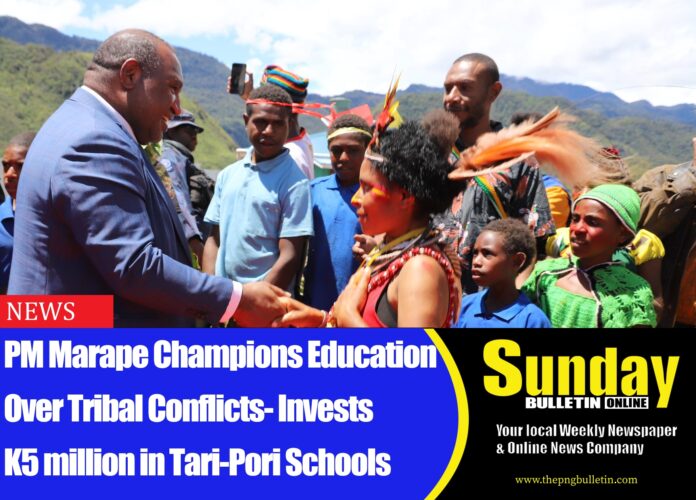
Port Moresby, Sunday, 27 April 2025 – Prime Minister Hon. James Marape has made an impassioned call for young people in Papua New Guinea, especially in his own Tari-Pori District, to abandon tribal fighting and embrace education as the true pathway to lasting peace, prosperity, and nation-building.
Prime Minister Marape reflected on the devastating impacts of tribal conflict and the urgent need to replace violence with learning.
“In the face of surrender by two warring tribes in my district, I say to the youth: lay down your guns, pick up a pen. Education is the most powerful weapon you can use to change your life and your country,” the Prime Minister said.
As part of this renewed focus, Prime Minister Marape announced a major investment into education in Tari-Pori, with over K5.15 million being distributed directly to all educational institutions across the district through the District Services Improvement Programme (DSIP).
Under this initiative:
- Primary and elementary schools received direct infrastructure support grants.
- High schools and secondary schools each received K150,000.
- Private schools each received K100,000.
The funds, managed through the District Development Authority (DDA) under CEO Mr Jack Walara, are targeted at upgrading school infrastructures: building new classrooms, teachers’ houses, installing solar power systems, maintaining existing facilities, and expanding school capacity.
“This is not the first time our district has made such interventions,” Prime Minister Marape stated. “We have a consistent track record of supporting our schools. However, this time, we are demanding stronger accountability. Schools will be required to sign agreements
with the DDA, and if anyone misappropriates these funds, police action will follow.”
The Prime Minister emphasised that schools also continue to receive Tuition Fee Free (TFF) funds from the national government, and that combined support from DSIP, TFF, and provincial contributions should ensure that no school in Tari-Pori is left behind in infrastructure development.
A Personal Story of Hope and Inspiration
In an emotional reflection, Prime Minister Marape shared his own journey to inspire students.
“My mother, when Tari was still isolated and the Southern Highlands was in its infancy, chose to invest in my education. That simple act of vision and sacrifice enabled me to become the person I am today. Education opened doors that would have otherwise remained closed.”
He used his personal story as a living testimony of the power of education to lift individuals and communities out of hardship and into leadership, prosperity, and national service.
Education as a Strategic Priority
The Tari-Pori District’s vision for the next two years, leading into 2027, is focused sharply on
education:
- Every LLG (Local-Level Government) will have at least one secondary school
and one technical/vocational school. - All primary schools will be modernised with new or refurbished classrooms,
teachers’ houses, and solar energy systems. - Hope Institute, the district’s flagship school for school-leavers and technical
training, will continue to provide pathways for youth who drop out of formal schooling. - Infrastructure improvements aim to expand student capacity, ensuring more
children can progress to universities, colleges, and skilled employment opportunities.
“We are putting our resources where they will yield generational returns,” Prime Minister Marape said. “This K5 million-plus investment is aimed at transforming our children’s futures. I appeal to all parents, leaders, and communities to rally behind this cause.”
The Prime Minister stressed that education was not just a district goal but aligned with his broader national vision for Papua New Guinea as it prepares to celebrate 50 years of Independence in 2025.
A Call to Action: Building a New Generation
Prime Minister Marape called on the young people of Tari-Pori and across Papua New Guinea to think beyond today’s challenges.
“I want more leaders, professionals, and entrepreneurs from Tari-Pori and every corner of our country. I want more James Marapes. That can only happen if you choose education over violence. Our government is doing its part — now the choice is yours.”
With the surrender of the warring tribes marking a hopeful turning point, the Tari-Pori District’s focus on rebuilding through education offers a powerful example for the rest of Papua New Guinea — that investing in human capital is the surest path to peace, progress, and prosperity.
